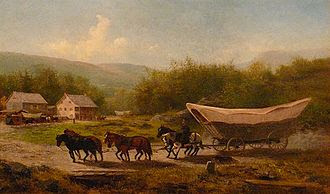by Denise Weimer
Scottish emigration to the American Colonies soared between 1707 and 1775, after the formation of the United Kingdom gave Scots legal access to all the British colonies. Nearly half of the immigrants came from Ulster, in Northern Ireland. These people became known in America as Scots-Irish. Like the Highlanders, they sought to escape depressed markets, poor harvests, and increasing rents. The Ulster Scots emigration began in 1718 with the destitute selling themselves into indentured servitude and those with means liquidating stock and houses to procure passage. Presbyterian ministers often organized transportation for their congregants.
At first, many arrived in Boston, but intolerance pushed them to Philadelphia and other regions of Pennsylvania. Only after Indian raids during the French and Indian War (1756-1763) disturbed the peace did Scots-Irish take to the Great Wagon Road down through the Shenandoah Valley to the Carolinas. Some traveled the Wilderness Road into East Tennessee. When Georgia and South Carolina began offering head rights grants, ships began to sail straight to Southern ports.
Some Presbyterian Scots converted to Methodism or became Baptist due to the hardy faith of circuit-riding preachers. As in Europe, many English settlers looked down on the Scots-Irish, calling them “crackers.”
However, the colonial governments favored Scots-Irish, with their Indian style of fighting and concepts of clan retribution, to create a barrier against the Indian threat on the frontier. In January of 1736, James Oglethorpe, founder of the Georgia colony, recruited a hundred and seventy-five Highlanders from Inverness, mostly MacIntoshes, to settle below Savannah and fend off the French to the west, the Spanish to the south, and marauding Appalachicola and Yemassee Indians from Florida. Each Highlander was provided passage, provisions for a year, and fifty acres of land for himself and each family member. Those who could afford to pay their own freight received five hundred acres. The town they settled became known as Darien. They dressed in traditional Scottish manner and spoke Gaelic. The women were allowed to own property and were trained in the manual of arms, capable of defending the fort. In the Battle of Bloody Marsh, the Highlanders held ground deserted by British troops against the Spanish, preserving Georgia as a British colony.
 |
| Lachlan McIntosh |
On the other hand, because Scots-Irish settlers enjoyed the best relations with Native Americans, many had served as traders and Indian agents, and some of these, such as Alexander Cameron and John Stuart, continued to encourage alliances between the Cherokees and Creeks and the British. Some Scots-Irish settlers feared losing their land if they sided with the colonials and lost.
I had fun researching Scottish customs and phrases for the characters of A Courageous Betrothal, which is being re-released next month as a novella in my Scouts of the Georgia Frontier Series, and A Cherished Betrothal, book three coming in January. Here are a few I uncovered:
Boggin’ – smelly, dirty
Breeks - trousers
Canny - smart
Fash – worry
Flap – get upset
Gilly gaupus – tall, awkward fellow
Princod – a round person
Shanky naggy – to travel on foot
Wheesht - shush
Now available, Book One of the Scouts of the Georgia Frontier, A Counterfeit Betrothal:
At the farthest Georgia outpost this side of hostile Creek Territory, Jared Lockridge serves his country as a scout to redeem his father’s botched heritage. Then he comes across a burning cabin and a traumatized woman just widowed by a fatal shot. Lame in one foot, Esther has always known she is secondhand goods, but the gentle carpenter-turned-scout draws out her heart…even though his is already pledged to another. His family’s love offers hope even as violence erupts along the frontier—and Jared’s investigation into local incidents brings danger to their doorstep.
https://www.amazon.com/Counterfeit-Betrothal-Scouts-Georgia-Frontier-ebook/dp/B0C8ZP46QD/
Denise Weimer writes historical and contemporary romance from her home in North Georgia and also serves as a freelance editor and the Acquisitions & Editorial Liaison for Wild Heart Books. A wife and mother of two daughters, she always pauses for coffee, chocolate, and old houses.
Monthly Newsletter Sign-up
Website
BookBub




Thank you for posting today. It was very interesting to hear of these immigrants and their settlements. Your book sounds great. My favorite word you listed was shanky naggy, I assume it makes sense from their native language!!!
ReplyDelete